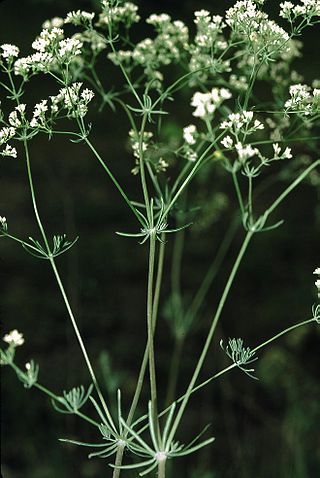
In botanical nomenclature, a form is one of the "secondary" taxonomic ranks, below that of variety, which in turn is below that of species; it is an infraspecific taxon. If more than three ranks are listed in describing a taxon, the "classification" is being specified, but only three parts make up the "name" of the taxon: a genus name, a specific epithet, and an infraspecific epithet.

Ernest Duchesne was a French physician who noted that certain molds kill bacteria. He made this discovery 32 years before Alexander Fleming discovered the antibiotic properties of penicillin, a substance derived from those molds, but his research went unnoticed.

Chlorophytum, is a genus of almost 200 species of evergreen perennial flowering plants in the century plant subfamily within the asparagus family. The plants are native to the tropical and subtropical regions of Africa, Australia, and Asia.

Hordeum murinum, commonly known as wall barley or false barley, is a species of grass, and a close relative of cultivated barley.

Galium glaucum or waxy bedstraw is a plant species of the Rubiaceae. It is native to central Europe from Portugal to Ukraine, and sparingly naturalized in a few locations in North America.

Africallagma glaucum is a species of damselfly in the family Coenagrionidae. It is found in Botswana, Gabon, Ghana, Kenya, Malawi, Mozambique, Namibia, Nigeria, Réunion, South Africa, Tanzania, Uganda, Zambia, Zimbabwe, and possibly Burundi. Its natural habitats are subtropical or tropical dry shrubland, subtropical or tropical moist shrubland, subtropical or tropical dry lowland grassland, swamps, intermittent freshwater lakes, intermittent freshwater marshes, and freshwater springs.

Halothamnus glaucus is a species of the plant genus Halothamnus, that belongs to the subfamily Salsoloideae of the family Amaranthaceae,. It occurs in Western and Central Asia.

Allium senescens subsp. glaucum, is a plant in the genus Allium. It is native to Siberia and Mongolia.

Thalictrum flavum, known by the common names common meadow-rue, poor man's rhubarb, and yellow meadow-rue, is a flowering plant species in the family Ranunculaceae. It is a native to Caucasus and Russia (Siberia). Growing to 100 cm (39 in) tall by 45 cm (18 in) broad, it is an herbaceous perennial producing clusters of fluffy yellow fragrant flowers in summer.

Allium senescens, commonly called aging chive, German garlic, or broadleaf chives, is a species of flowering plant in the genus Allium.
Ensete glaucum, the snow banana, has also been classified as Musa nepalensis, Ensete giganteum, or Ensete wilsonii.

Oxybasis glauca, common name oak-leaved goosefoot, is a species of goosefoot plant native to Europe. It has been introduced and become an invasive weed in North America. This invader of European origin also appears in trampled communities in North Korea.

Cerastoderma glaucum, the lagoon cockle, is a species of saltwater clam, a marine bivalve mollusc in the family Cardiidae, the cockles.

Sarcophyton glaucum, also known as toadstool leather coral or rough leather coral, is a common species of soft coral found from the Red Sea to western Pacific Ocean. Sarcophyton glaucum belongs to the phylum Cnidaria, the class Anthozoa, and the family Alcyoniidae.

Acanthocalycium klimpelianum is a species of Acanthocalycium from Argentina.

Acanthocalycium spiniflorum is a species of flowering plant in the cactus family Cactaceae from Argentina.

Acanthocalycium thionanthum is a species of Acanthocalycium from Argentina.

Echinopsis klingleriana, is a species of Echinopsis found in Bolivia.

Acanthocalycium rhodotrichum is a species of Acanthocalycium found in Argentina, Bolivia, Brazil, Paraguay, and Uruguay

















